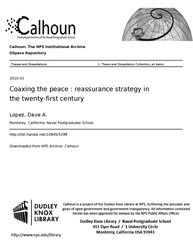File:Coaxing the peace - reassurance strategy in the twenty-first century (IA coaxingpeacereas109455399).pdf
Appearance

Size of this JPG preview of this PDF file: 463 × 599 pixels. Other resolutions: 185 × 240 pixels | 371 × 480 pixels | 593 × 768 pixels | 1,275 × 1,650 pixels.
Original file (1,275 × 1,650 pixels, file size: 1.03 MB, MIME type: application/pdf, 149 pages)
File history
Click on a date/time to view the file as it appeared at that time.
| Date/Time | Thumbnail | Dimensions | User | Comment | |
|---|---|---|---|---|---|
| current | 02:31, 16 July 2020 |  | 1,275 × 1,650, 149 pages (1.03 MB) | Fæ | FEDLINK - United States Federal Collection coaxingpeacereas109455399 (User talk:Fæ/IA books#Fork8) (batch 1993-2020 #11559) |
File usage
No pages on the English Wikipedia use this file (pages on other projects are not listed).



